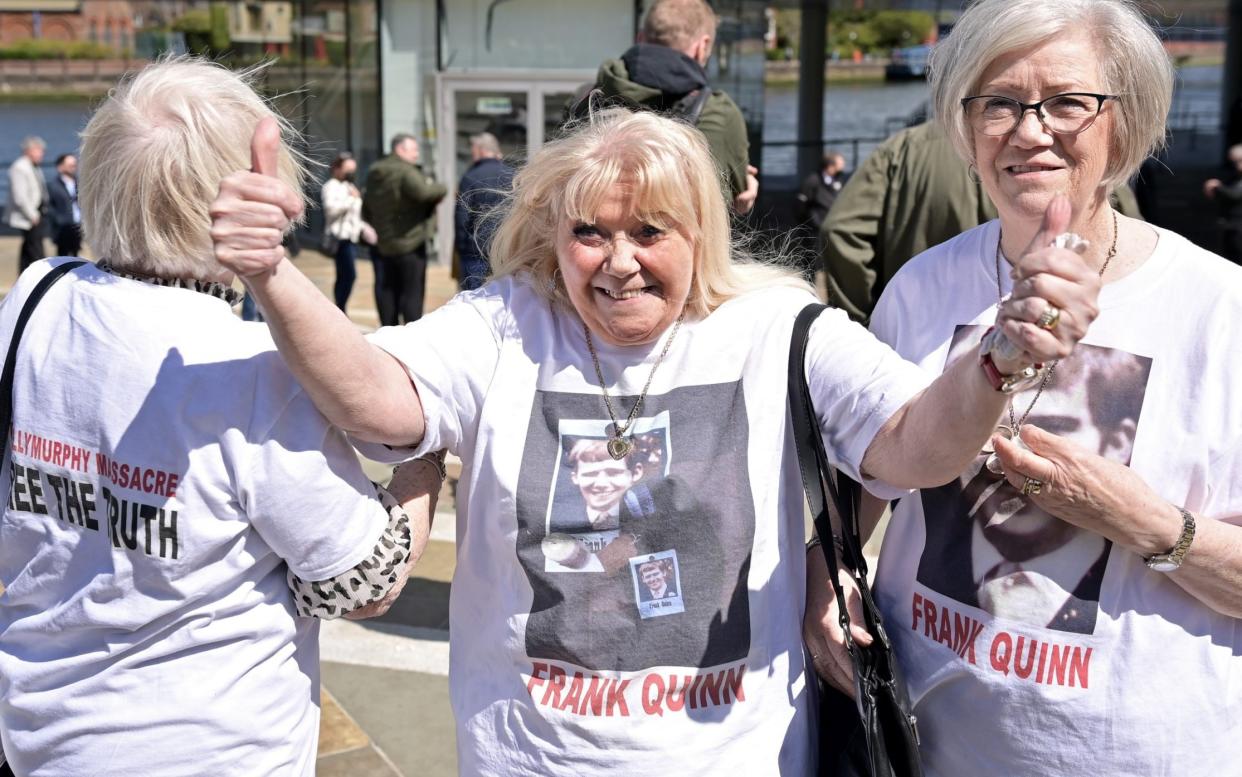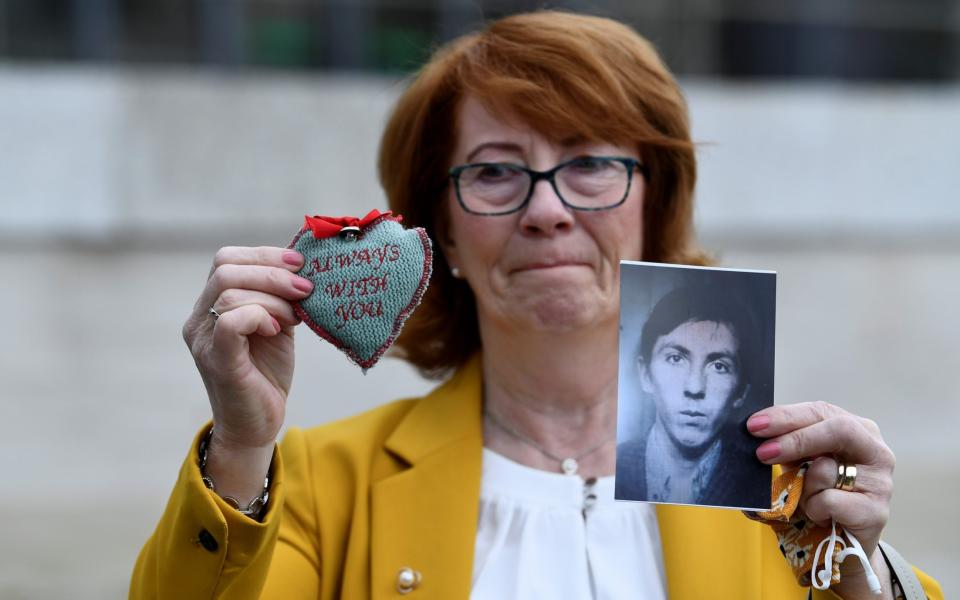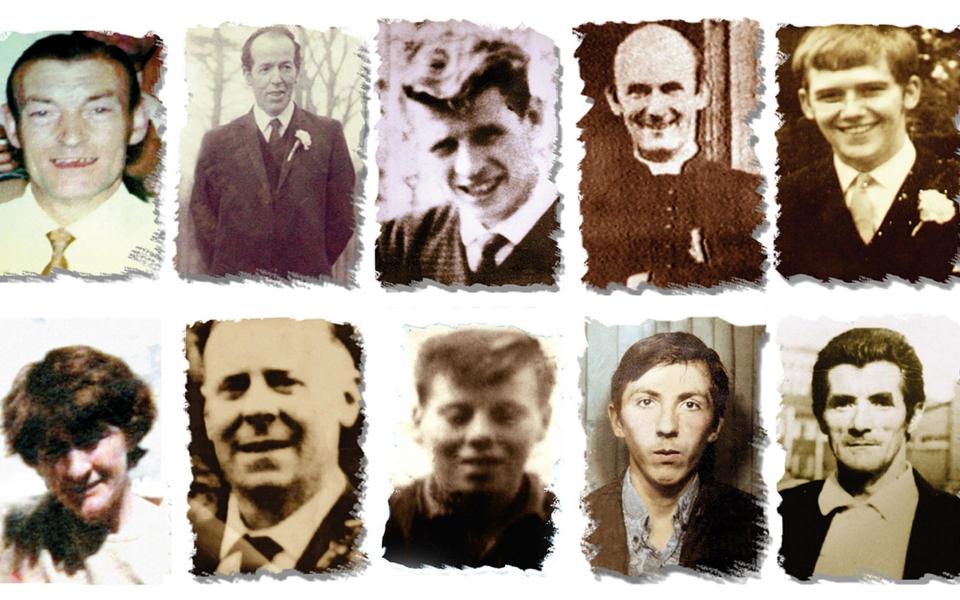Northern Ireland veteran faces prosecution over Ballymurphy deaths

A former paratrooper faces prosecution over the Ballymurphy “massacre” after a coroner ruled yesterday that 10 “entirely innocent” victims were shot dead by the British Army in Belfast almost 50 years ago.
A judge presiding over the inquest concluded that the soldier – who can be identified only as M3 – killed Edward Doherty, a builder, during three days of violence in August 1971.
The ruling came on the day the Government promised it would introduce legislation to protect veterans of the Northern Ireland conflict from being dragged to court. The commitment made in the Queen’s Speech was immediately questioned by Johnny Mercer, the former veterans’ minister, who was sacked before he could resign, who said: “I just cannot be part of an administration that is going to promise these people things and then not make almost any effort to deliver on them.”
Theresa May also expressed her doubt over the Government’s ability to introduce a statute of limitations for soldiers that did not give equivalent protection for terrorists.
The shootings in the Republican stronghold of Ballymurphy occurred during an operation to arrest and detain suspected members of the IRA, immediately following the introduction of internment.
Two years after the inquest began in 2018, Mrs Justice Keegan concluded all the victims – including a Catholic priest and a mother-of-eight – were “entirely innocent of any wrongdoing on the day in question” and that the deaths between August 9 and August 11 1971 were “unjustified”.
She added: “The Army had a duty to protect lives and minimise harm, and the use of force was clearly disproportionate.”

But the coroner was unable to identify conclusively which soldiers were responsible except in the case of Mr Doherty, 31, who died on the second day of the violence.
In her judgment, the coroner accepted there had been a “threat” to the soldier M3 “from a petrol bomber … with the result that M3 was in fear for his life”. But although M3 would have been justified in shooting the petrol bomber, he had “fired in a manner which was disproportionate” when firing his Sterling submachine gun, the bullet hitting Mr Doherty, who was standing behind a barricade.
It is understood a report will now be passed to the Public Prosecution service in Northern Ireland to consider charging M3, now in his 70s, over the killing.
A landmark murder trial of two British paratroopers – known only as Soldier A and Soldier C – over the death of Joe McCann, an IRA Commander, collapsed last week after just six days.
Patrick Doherty, Edward Doherty’s son, said yesterday: “It is a weight off my shoulders, it’s been 50 years of serious hard grief and pain, I just feel serious relief. We have always known he was an innocent man. There is a sense of happiness that we have finally cleared our loved ones’ names.”

Relatives of the victims applauded as Mrs Justice Keegan read out her lengthy ruling. The victims included Joan Connolly, 44, who left behind eight children, and Father Hugh Mullan, 38, a priest who went to attend a wounded man. The other eight victims were: Joseph Corr, 43, Edward Doherty, 31, John Laverty, 20, John McKerr, 49, Fr Joseph Murray, 41, Noel Phillips, 19, Frank Quinn, 19, and Daniel Teggart, 44. The coroner said there was not enough evidence to prove John McKerr was shot by soldiers but said it was “shocking” that there had been no adequate investigation in the aftermath.
The son of one of the Ballymurphy victims read out the names of the 10 dead at a press conference in Corpus Christi Youth Club in Belfast, pausing to say the word “innocent” after every name.
John Teggart, whose father Danny was shot by a soldier in August 1971, said: “Mrs Justice Keegan declared that unjustified force was used in the killing of our loved ones. After 50 years they have finally had their names cleared.
“During the inquest, we had to sit through 100 days of evidence, each day we relived the horror of what happened to our loved ones. It wasn’t easy, in fact it was awful.
“What gave us strength to get through it was the knowledge that every day was another blow to the MoD [Ministry of Defence] and the web of lies from 50 years ago.”
Mr Teggart said victims’ families would not accept the Government’s proposed amnesty for ex-soldiers. “No one should be above the law. We will not accept an amnesty for these murders,” he said.
Eileen McKeown, the daughter of Joseph Corr, said: “We have fought long and hard for this, for 50 years, to declare my Daddy an innocent man. My Mummy died knowing he was innocent but not getting any justice. I have lost four brothers to this, through the stress and the trauma that they had to live through.”
Victims condemned the prospect of legislative protection for troops. Maura McGee, a daughter of Joan Connolly, said: “I don't agree with an amnesty for anybody. I think you have to go where the evidence leads you and if the evidence shows there was foul play whether you were wearing a uniform or a paramilitary uniform or you were wearing a T-shirt and jeans – if you killed someone, you should answer for it.”
MPs cast doubt on Government’s promises
On the same day the Government announced its intention to introduce protective legislation for Northern Ireland veterans, Mr Mercer, the former minister for veterans, said he doubted it would deliver on its pledge.
Mr Mercer told the defence select committee: “These things are all down to political will. There are options. They require a commitment, a degree of leadership, statesmanship, ability that has not been there to date.”
Explaining why he had offered to resign before being sacked, he told MPs: “It is about political priorities, it is about sticking to your promises. By the end, if I am honest, I felt I was the last man in the room who believed we should follow through on that, so I left.”
Later Mr Mercer posted on Twitter that his “heart goes out” to victims’ families, describing the events at Ballymurphy as “deeply tragic”.
Important to front up when Coroners have findings like that of Ballymurphy. Deeply tragic, and my heart goes out to the families. Fairness cuts both ways, and where credible new evidence exists prosecutors must examine. But we must be fair to all sides, including Veterans. pic.twitter.com/NsmQZlc841
— Johnny Mercer (@JohnnyMercerUK) May 11, 2021
He added: “Fairness cuts both ways and where credible new evidence exists prosecutors must examine. But we must be fair to all sides, including veterans”.
Mrs May, the former prime minister, told the Commons: “The argument for the protection of veterans has consistently failed to understand one basic point – you cannot legislate simply to protect British soldiers from prosecution; any legislation to protect British soldiers will cover terrorists as well.
“It’s a very simple fact but it seems impossible for many people to accept, but once you recognise the position then the options become clearer. Because it becomes clear either you continue to investigate and lead to prosecutions for everyone, including veterans, or you draw some sort of line.”
Brandon Lewis, the Northern Ireland Secretary, on Tuesday night acknowledged the "terrible hurt" that had been caused to the families of those killed in the shootings. In a statement he said the Government would "carefully consider" the findings set out by the coroner.
He said: "This Government is clear that the current system for dealing with the legacy of the Troubles is not working for anyone."

